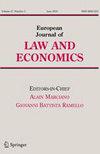在总量管制与交易机制中对损害进行补偿
IF 1.1
3区 社会学
Q3 ECONOMICS
引用次数: 0
摘要
本文在一种情况下重新审视科斯关于财产权的观点,即法律允许对经济活动的特定有害影响(如空气污染或交通拥堵)建立强制性限制(上限)。我们提出了一个具有限额与交易机制的一般均衡模型,其中遭受损害的代理人共享根据限额设计的科斯亚权利组合。平衡分配必须遵守上限,减少污染排放或从私人交通转向公共交通。此外,由于向污染者出售权利而产生的货币转移对受损害的人口产生了补偿,增加了非污染者的收入。本文章由计算机程序翻译,如有差异,请以英文原文为准。
Coasian rights in a cap-and-trade mechanism with damage compensations
This paper revisits Coase’s ideas on property rights in a scenario where the law allows the establishment of mandatory limits - caps- to specific harmful effects of economic activity such as air pollution or traffic congestion. We propose a general equilibrium model with a cap-and-trade mechanism where agents suffering the harm share a portfolio of Coasian rights designed according to the caps. Equilibrium allocations must comply with the cap, reducing polluting emissions or switching from private to public transport. In addition, the monetary transfers that result from the sale of rights to polluters yield compensation to the harmed population, increasing the non-polluters income.
求助全文
通过发布文献求助,成功后即可免费获取论文全文。
去求助
来源期刊

European Journal of Law and Economics
Multiple-
CiteScore
2.40
自引率
7.70%
发文量
37
期刊介绍:
The European Journal of Law and Economics provides readers with high-quality theoretical and empirical research in which both the legal and economic dimensions merge and combine. The journal welcomes articles that promote a better understanding of legal phenomena, legal decisions made by judges, courts or regulatory agencies, and involving economic tools. Theoretical papers are welcome, provided they have a strong basis in law and economics. We also welcome case studies, as well as empirical analyses – including empirical legal studies – and experimental investigations. The European Journal of Law and Economics does not favor any particular topic, but does have a focus on new and emerging problems. European themes are particularly welcome, because we feel it is important to exploit Europe’s considerable institutional diversity in order to build a more robust body of theory and empirical evidence. However, the purpose of the journal is also to showcase the diversity of law and economics approaches, as supplied by an international mix of authors. Drawing on the support of respected scholars from around the world, who serve as consulting editors and editorial board members, the Editors wish to give contributing authors the opportunity to improve their papers, while also offering them a quick and efficient review process.
Officially cited as: Eur J Law Econ
 求助内容:
求助内容: 应助结果提醒方式:
应助结果提醒方式:


